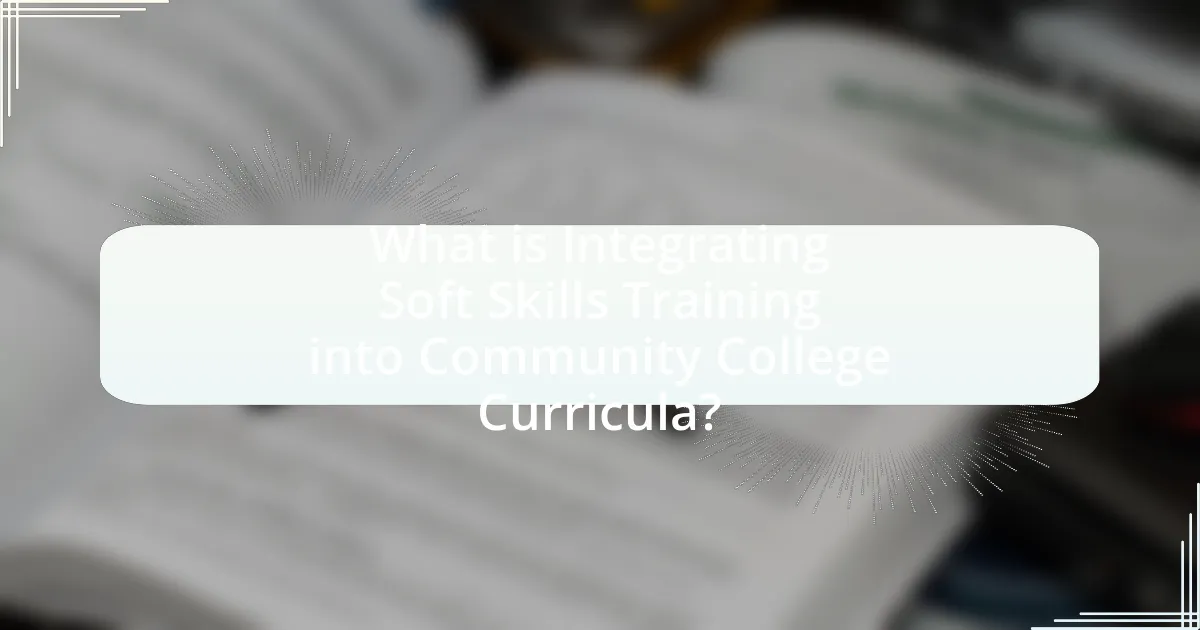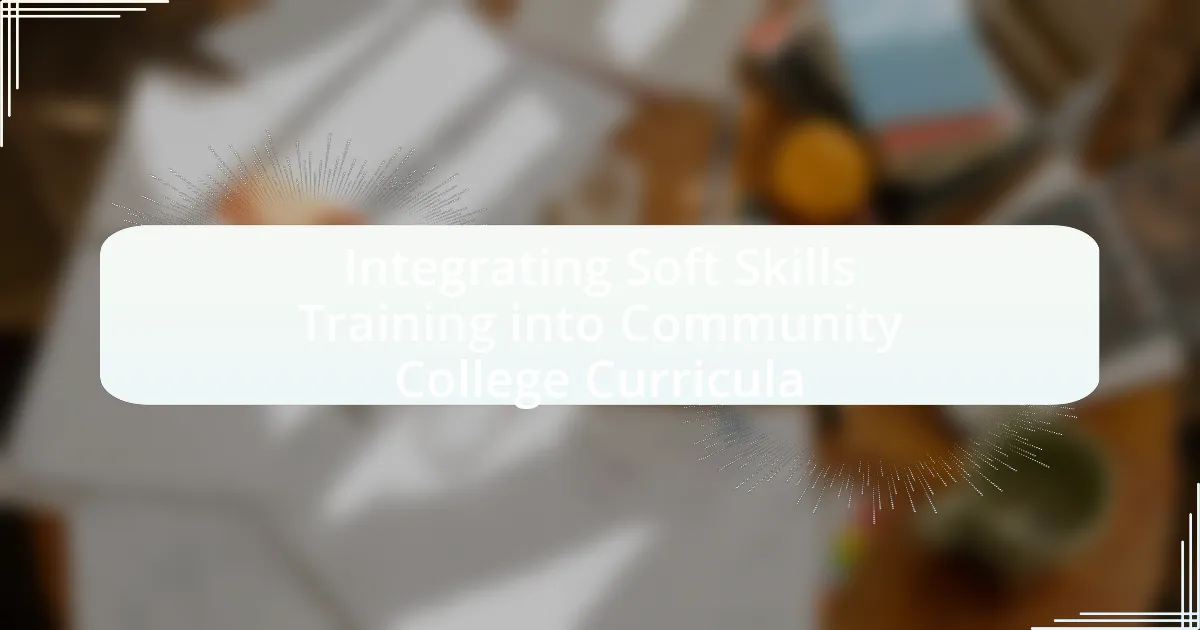Integrating soft skills training into community college curricula is essential for enhancing students’ employability and preparing them for the workforce. The article outlines the importance of soft skills such as communication, teamwork, and problem-solving, which employers increasingly prioritize alongside technical knowledge. It discusses effective methods for integrating these skills into academic programs, the challenges faced by community colleges, and strategies for overcoming these barriers. Additionally, the article highlights the role of partnerships with local businesses and the significance of experiential learning in developing soft skills, ultimately demonstrating how such training can lead to improved career readiness and workplace performance for graduates.

What is Integrating Soft Skills Training into Community College Curricula?
Integrating soft skills training into community college curricula involves incorporating essential interpersonal skills, such as communication, teamwork, and problem-solving, into academic programs. This integration aims to enhance students’ employability and prepare them for the workforce, as employers increasingly prioritize these skills alongside technical knowledge. Research indicates that 93% of employers consider soft skills as critical for job success, highlighting the necessity for educational institutions to adapt their curricula accordingly. By embedding soft skills training within various courses, community colleges can better equip students for real-world challenges and improve their overall career readiness.
Why is soft skills training important in community colleges?
Soft skills training is important in community colleges because it enhances students’ employability and prepares them for the workforce. Research indicates that employers prioritize soft skills, such as communication, teamwork, and problem-solving, alongside technical abilities. According to a study by the National Association of Colleges and Employers, 73% of employers seek candidates with strong interpersonal skills. By integrating soft skills training into curricula, community colleges equip students with essential competencies that are critical for career success and adaptability in diverse work environments.
What specific soft skills are most valuable for students?
The most valuable soft skills for students include communication, teamwork, problem-solving, adaptability, and emotional intelligence. Communication skills enable students to express ideas clearly and effectively, which is essential in both academic and professional settings. Teamwork skills foster collaboration, allowing students to work well with others to achieve common goals. Problem-solving skills equip students to analyze situations and develop effective solutions, a critical ability in any field. Adaptability helps students navigate change and uncertainty, which is increasingly important in today’s fast-paced world. Emotional intelligence allows students to understand and manage their emotions and those of others, enhancing interpersonal relationships. These skills are supported by research indicating that employers prioritize soft skills alongside technical abilities, as they are crucial for workplace success.
How do soft skills impact employability and career success?
Soft skills significantly enhance employability and career success by improving interpersonal interactions, problem-solving abilities, and adaptability in the workplace. Research indicates that 93% of employers consider soft skills as critical for job performance, with effective communication and teamwork being particularly valued. Furthermore, a study by the National Association of Colleges and Employers found that employers prioritize soft skills over technical skills, as they are essential for fostering a collaborative work environment and driving organizational success. This correlation between soft skills and career advancement underscores the importance of integrating soft skills training into community college curricula to better prepare students for the workforce.
How can community colleges effectively integrate soft skills training?
Community colleges can effectively integrate soft skills training by embedding these skills into existing curricula and offering dedicated workshops. By incorporating soft skills such as communication, teamwork, and problem-solving into courses across various disciplines, colleges ensure that students practice these skills in context. Research from the Association of American Colleges and Universities indicates that 93% of employers prioritize soft skills in hiring, highlighting the necessity of such training. Additionally, community colleges can collaborate with local businesses to create real-world scenarios and internships that reinforce soft skills, thereby enhancing students’ employability and readiness for the workforce.
What teaching methods are most effective for soft skills training?
Experiential learning methods are the most effective for soft skills training. These methods, which include role-playing, simulations, and group discussions, allow learners to practice and refine their interpersonal skills in real-world scenarios. Research indicates that experiential learning enhances retention and application of soft skills, as it engages participants actively and encourages reflection on their experiences. A study by Kolb (1984) emphasizes that learning through experience significantly improves skill acquisition, making it a vital approach in community college curricula focused on soft skills development.
How can faculty be trained to teach soft skills?
Faculty can be trained to teach soft skills through structured professional development programs that focus on experiential learning and collaborative teaching methods. These programs should include workshops that emphasize communication, teamwork, and problem-solving skills, allowing faculty to practice and model these skills in real-world scenarios. Research indicates that faculty who engage in active learning strategies are more effective in imparting soft skills to students, as demonstrated in the study “Teaching Soft Skills: A Review of the Literature” by McGowan and Graham, which highlights the importance of faculty training in enhancing student outcomes in soft skills development.

What challenges exist in integrating soft skills training?
Integrating soft skills training faces several challenges, including curriculum alignment, resource allocation, and assessment methods. Curriculum alignment is difficult because soft skills often do not fit neatly into existing academic frameworks, making it challenging for educators to incorporate them effectively. Resource allocation poses a challenge as community colleges may lack the funding or personnel to implement comprehensive soft skills programs. Additionally, assessing soft skills is inherently subjective, complicating the evaluation process and making it hard to measure student progress accurately. These challenges hinder the successful integration of soft skills training into community college curricula.
What barriers do community colleges face in implementing soft skills programs?
Community colleges face several barriers in implementing soft skills programs, including limited funding, lack of trained faculty, and insufficient curriculum integration. Limited funding restricts the resources available for developing and maintaining these programs, as many community colleges operate on tight budgets. Additionally, the lack of trained faculty who can effectively teach soft skills hinders program development, as instructors may not have the necessary expertise or training. Furthermore, insufficient integration of soft skills into existing curricula makes it challenging to prioritize these programs amidst other academic requirements, leading to a fragmented approach to soft skills education.
How can funding limitations affect soft skills training initiatives?
Funding limitations can significantly hinder soft skills training initiatives by restricting the resources available for program development and delivery. When financial support is inadequate, community colleges may struggle to hire qualified instructors, purchase necessary materials, or implement comprehensive training programs. For instance, a study by the American Association of Community Colleges found that 70% of community colleges reported budget constraints as a barrier to expanding workforce training programs, including soft skills development. This lack of funding can lead to reduced training quality, fewer course offerings, and limited access for students, ultimately undermining the effectiveness of soft skills training initiatives.
What resistance might faculty or administration have towards soft skills training?
Faculty and administration may resist soft skills training due to perceived irrelevance to academic curricula and concerns about resource allocation. Many educators prioritize traditional academic skills, viewing soft skills as secondary or non-essential, which can lead to skepticism about their value in enhancing student employability. Additionally, faculty may worry that implementing such training requires significant time and financial investment, diverting resources from core academic programs. Research indicates that community colleges often face budget constraints, making it challenging to justify expenditures on soft skills initiatives without clear evidence of their impact on student success.
How can these challenges be overcome?
To overcome the challenges of integrating soft skills training into community college curricula, institutions can implement structured programs that combine theoretical knowledge with practical applications. Research indicates that experiential learning, such as internships and collaborative projects, enhances the development of soft skills among students. For instance, a study by the National Association of Colleges and Employers found that 93% of employers prioritize soft skills in hiring, emphasizing the need for educational institutions to adapt their curricula accordingly. By fostering partnerships with local businesses and organizations, community colleges can create opportunities for students to practice these skills in real-world settings, thereby addressing the gap between academic training and workforce requirements.
What strategies can be employed to secure funding for soft skills programs?
To secure funding for soft skills programs, community colleges can employ strategies such as forming partnerships with local businesses, applying for grants, and demonstrating the economic impact of soft skills training. Partnerships with local businesses can provide financial support and resources, as companies often seek employees with strong soft skills. For instance, a study by the National Association of Colleges and Employers found that 93% of employers value soft skills in candidates, highlighting the demand for such training. Additionally, colleges can apply for grants from organizations like the U.S. Department of Labor, which funds initiatives aimed at workforce development. By showcasing data on how soft skills training improves employability and productivity, colleges can effectively argue for funding, as evidenced by research from the Brookings Institution, which indicates that soft skills training can lead to a 12% increase in job performance.
How can community colleges promote the value of soft skills training to stakeholders?
Community colleges can promote the value of soft skills training to stakeholders by actively demonstrating its impact on student employability and success. Research indicates that 93% of employers consider soft skills as critical to their hiring decisions, highlighting the necessity for community colleges to integrate these skills into their curricula. By showcasing partnerships with local businesses that emphasize the importance of soft skills, community colleges can provide tangible evidence of how such training enhances workforce readiness. Additionally, conducting workshops and seminars that involve stakeholders in discussions about the relevance of soft skills can further solidify their value, ensuring that community colleges remain aligned with industry needs and expectations.

What are the outcomes of successful integration of soft skills training?
Successful integration of soft skills training leads to improved employability and workplace performance among students. Research indicates that graduates who possess strong soft skills, such as communication, teamwork, and problem-solving, are more likely to secure jobs and advance in their careers. For instance, a study by the National Association of Colleges and Employers found that 73% of employers prioritize candidates with strong interpersonal skills. Additionally, organizations report enhanced team collaboration and productivity when employees are trained in soft skills, demonstrating a direct correlation between such training and positive workplace outcomes.
How does soft skills training enhance student learning experiences?
Soft skills training enhances student learning experiences by improving communication, teamwork, and problem-solving abilities. These skills are essential for academic success and future employment, as they enable students to collaborate effectively and articulate their ideas clearly. Research indicates that students who engage in soft skills training demonstrate higher levels of engagement and retention in their studies. For instance, a study by the Association of American Colleges and Universities found that 93% of employers prioritize soft skills in hiring, highlighting the importance of these competencies in the workforce. By integrating soft skills training into community college curricula, institutions can better prepare students for real-world challenges, ultimately leading to improved academic performance and career readiness.
What evidence exists to support the effectiveness of soft skills training?
Evidence supporting the effectiveness of soft skills training includes various studies demonstrating improved employability and workplace performance. For instance, a meta-analysis by the National Center for Education Statistics found that students who participated in soft skills training programs showed a 12% increase in job placement rates compared to those who did not receive such training. Additionally, research published in the Journal of Applied Psychology indicated that employees with strong soft skills, such as communication and teamwork, were 26% more likely to receive promotions than their peers lacking these skills. These findings underscore the significant impact of soft skills training on career advancement and job readiness.
How do employers perceive graduates with strong soft skills?
Employers perceive graduates with strong soft skills as highly valuable assets to their organizations. These graduates are often seen as better equipped to collaborate effectively, communicate clearly, and adapt to changing work environments. Research from the National Association of Colleges and Employers indicates that 93% of employers prioritize soft skills, such as teamwork and problem-solving, over technical skills when hiring. This emphasis on interpersonal abilities reflects the growing recognition that strong soft skills contribute significantly to workplace productivity and a positive organizational culture.
What best practices can community colleges adopt for soft skills training?
Community colleges can adopt several best practices for soft skills training, including integrating experiential learning opportunities, utilizing industry partnerships, and implementing assessment frameworks. Experiential learning, such as internships and project-based assignments, allows students to practice communication, teamwork, and problem-solving in real-world contexts. Collaborating with local businesses ensures that the training aligns with workforce needs, enhancing employability. Additionally, using assessment frameworks, such as rubrics and self-reflections, helps measure students’ soft skills development and provides feedback for improvement. These practices are supported by research indicating that hands-on experiences and employer engagement significantly enhance soft skills acquisition among students.
What role do partnerships with local businesses play in soft skills training?
Partnerships with local businesses play a crucial role in soft skills training by providing real-world contexts and practical experiences for students. These collaborations enable community colleges to align their training programs with the specific needs of the local job market, ensuring that students develop relevant skills such as communication, teamwork, and problem-solving. For instance, a study by the National Association of Colleges and Employers found that 73% of employers prioritize soft skills in hiring, highlighting the importance of integrating these skills into educational curricula through partnerships. By engaging local businesses, community colleges can facilitate internships, workshops, and mentorship programs that enhance students’ soft skills, making them more competitive in the workforce.
How can community colleges assess the effectiveness of their soft skills programs?
Community colleges can assess the effectiveness of their soft skills programs through a combination of student feedback, performance evaluations, and employer surveys. Student feedback can be gathered via surveys and focus groups to understand their perceptions of the program’s impact on their communication, teamwork, and problem-solving abilities. Performance evaluations can be conducted by instructors who observe students in real-world scenarios, measuring their application of soft skills in projects and presentations. Additionally, employer surveys can provide insights into how well graduates demonstrate these skills in the workplace, with data showing that 93% of employers consider soft skills as critical for job success. This multi-faceted approach ensures a comprehensive evaluation of the programs’ effectiveness.
What practical steps can community colleges take to implement soft skills training?
Community colleges can implement soft skills training by integrating it into existing curricula, developing dedicated workshops, and collaborating with local businesses for real-world experience. Integrating soft skills into courses ensures that students learn communication, teamwork, and problem-solving alongside technical skills. Dedicated workshops can focus specifically on areas such as conflict resolution and leadership, providing students with hands-on practice. Collaborating with local businesses allows students to engage in internships or projects that require the application of soft skills in professional settings, enhancing their employability. These steps are supported by research indicating that employers prioritize soft skills, with a survey by the National Association of Colleges and Employers showing that 73% of employers seek candidates with strong interpersonal skills.

Leave a Reply